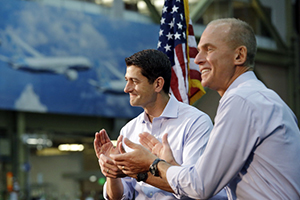Updated August 27, 2107 at www.seattletimes.com
Paul Ryan Picked the Most Awkward Spot in America to Argue for Corporate Tax Cuts
Uh, Mr. Speaker? I hope you looked around on your Seattle visit. Because there’s probably no place where big business is less in need of a big tax break. And no company that’s already had more than its fair helping of them than Boeing.
By Danny Westneat
Seattle Times staff columnist
U.S. House Speaker Paul Ryan couldn’t, or more likely, wouldn’t, believe his own eyes.
There he was, smack dab in the middle of Boeing’s 787 rocking production lineup in Everett, inside the largest manufacturing facility in the world. Place was humming.
“I’ve never seen anything like this my entire life,” he gushed.
But then, channeling his inner Ayn Rand, Ryan launched into boilerplate about what a miracle it was that Boeing can even get out of bed in the morning, what with the hellscape of taxes it faces from the government.
“For Boeing, we are taxing this business, these planes, your jobs in this country at a much higher tax rate than our foreign competitors tax theirs,” the Republican said. “You know what the tax rate here is? Thirty-five percent! “
Gesturing at the activity in the plant, he added: “I’m just in awe that in spite of all that, you’re still doing so well.”
Inconveniently well! Boeing’s on a roll of huge profits and back jet orders, with its stock up 50 percent for the year. When Boeing last reported its earnings, analysts were also in awe — and not at its tax burdens.
“Monster cash flow,” said one. “Boeing: stunning,” summed up another.
What’s most stunning here is the chutzpah of using our dear old Boeing to try to make a political case that corporate taxes in this country are too high.
Facts are for suckers these days, but c’mon. Not only is Boeing gushing cash, but its own financial documents show it has actually paid an average federal income tax of just 3.2 percent of profits over the past 15 years. That’s less than one-tenth the figure Ryan cited.
It doesn’t even count the largest tax break in U.S. history granted by the state of Washington, which reduced the company’s state business tax burden in 2015 nearly to zero.
“The question with Boeing isn’t whether high taxes are hurting them, because that’s ludicrous on the face of it,” says Matt Gardner, a senior fellow at the Institute on Taxation and Economic Policy, a Washington, D.C., outfit that tracks the taxes companies pay. “The question with Boeing is: How much lower could their taxes possibly go?”
There are only a few digits below 3.2 percent. But Boeing CEO Dennis Muilenburg was nodding and thumbs-upping like a late-night talk-show sidekick throughout Ryan’s remark. So the company seems eager to figure out the math.
The idea that American big business somehow can’t get ahead due to taxes is a “faith-based argument,” Gardner says.
“Corporate profits are gangbusters right now. Corporate taxes as a share of the economy are, in the past 10 years, as low as they’ve ever been.”
While the listed rate is 35 percent, hardly any company pays that due to extensive loopholes, subsidies and deductions that lower the burden. As we know around here, Boeing is especially skilled at feeding at this corporate-subsidy trough.
In a recent study, Gardner found that of 258 profitable Fortune 500 companies, 100 paid no taxes in at least one year out of the past eight (for Boeing, it was four of those years.) Eighteen companies paid nothing over the whole period, despite booking $177 billion in profits.
Now there’s nothing wrong with any company doing whatever it can legally to pay as little as possible (including lobbying to pay even less, as Boeing is doing now). Boeing also is a fantastic asset to our region.
But we’ve all got to help pay the bills, you know? With the economy doing fine, unemployment low and corporate profits over the moon, what possible rationale is there to add to the national deficit right now with huge corporate tax cuts?
There’s an even bigger problem than the numbers. Which is that people already see the system as rigged.
“When you have corporations paying taxes of 3 percent or 5 percent, which is much less than a middle-class family pays, it just creates distrust,” Gardner says.
The speaker of the House looked around, but he didn’t see. Boeing is a great company, but about the last one in need of even more help.
http://www.seattletimes.com/seattle-news/politics/paul-ryan-picked-the-most-awkward-spot-in-america-to-argue-for-corporate-tax-cuts/?utm_source=facebook&utm_medium=social&utm_campaign=article_left_1.1
